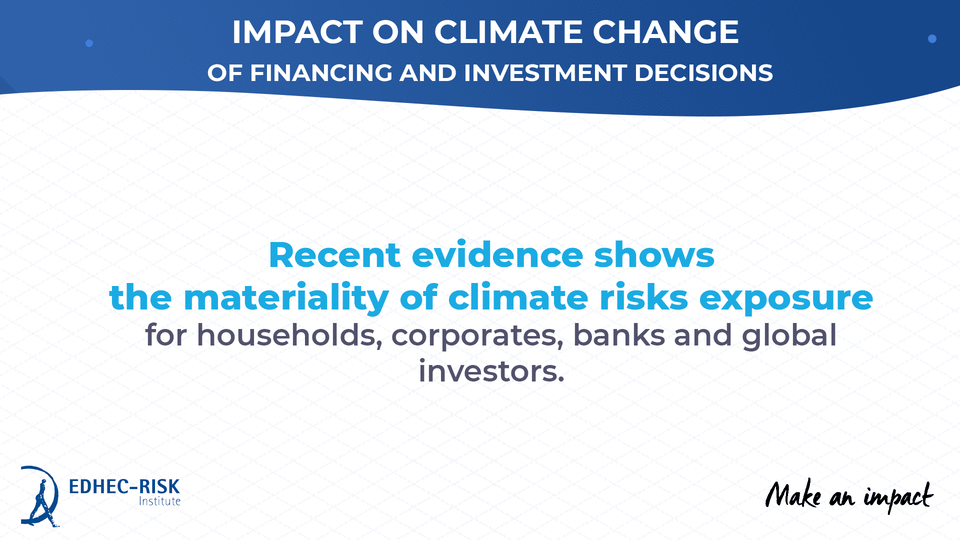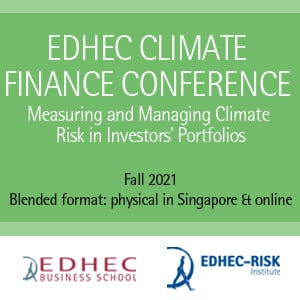
Sustainable Investing
Financial decisions worldwide are increasingly influenced by the scarcity of resources, and the physical and transition risks associated with climate change. The extent of the environmental impact from climate change is still uncertain but the recent scientific evidence is increasingly worrisome and many governments are taking decisive steps in order to avert a catastrophe. The transition towards a low-carbon economy requires a broad array of financial instruments and innovations that will have far-reaching implications for markets, corporations, intermediaries, and investors.
As part of our effort to help investors and asset managers adequately deal with these new risk factors, EDHEC-Risk Institute has launched an ambitious programme that will explore the impact of climate change on asset prices and evaluate the impact of financial decisions on the fight against climate change. On June 9 2020, the EDHEC Business School joined the Global Research Alliance for Sustainable Finance and Investment (GRASFI), the global network for cutting-edge research on sustainable finance and investment.
Impact of Climate Change on Asset Prices and Risk Management
It is still not clear how decisive climate control efforts will be in the coming decades. If little is done, the damage to the planet and, as a consequence, to the economy may be very severe. If, on the other hand, decisive action is taken, the redirection of resources to climate change abatement will have to be on a war-effort scale. And there are, of course, lots of intermediate outcomes. Each of these ‘possible worlds’ will have an impact on the returns one can expect from financial assets. Assets distribute to investors what the economy produces after labour has received its share. Therefore, the chosen abatement path will have an obvious first-order impact on asset returns. In addition to this, the transformative nature of the resource allocation called for by a decisive abatement effort will give rise to major differences in the returns of different asset classes, which in turns has profound implication for risk and asset allocation decisions.
 This programme is led by Riccardo Rebonato, Professor of Finance at EDHEC Business School, a specialist in interest rate risk modelling with applications to bond portfolio management and fixed-income derivatives pricing. He was previously Global Head of Rates and FX Research at PIMCO. He has published extensively on the use of Bayesian nets for stress testing and asset allocation. His past academic experience in the hard sciences (physics & nuclear engineering) is a unique asset in the adaptation of the existing IAMs to the task at hand.
This programme is led by Riccardo Rebonato, Professor of Finance at EDHEC Business School, a specialist in interest rate risk modelling with applications to bond portfolio management and fixed-income derivatives pricing. He was previously Global Head of Rates and FX Research at PIMCO. He has published extensively on the use of Bayesian nets for stress testing and asset allocation. His past academic experience in the hard sciences (physics & nuclear engineering) is a unique asset in the adaptation of the existing IAMs to the task at hand.
Impact of Financing and Investment Decisions on Climate Change
Recent evidence sheds light on the magnitude and pervasiveness of climate risks exposure for households, corporates, banks and global investors. The scale of these risks is substantial and possibly larger even than those that triggered the financial crisis. Besides measuring and acting on climate risks, the global financial system will be crucial in channelling capital towards green assets, especially to generate clean power. As part of our effort to help financial actors assess the risks and opportunities of the climate transition, EDHEC-Risk Institute is launching an ambitious research programme on climate-footprint metrics, clean energy financing and valuation tools for climate-related investments.
In Video : Are Finance and Sustainability really compatible
 This programme is led by Gianfranco Gianfrate, Professor of Finance, EDHEC Business School. He writes and researches on sustainable finance, socially responsible investing, climate change finance, carbon pricing. Prior to joining EDHEC Business School, he held teaching and research positions at Erasmus University, Harvard University, and Bocconi University. Gianfranco also has extensive experience in the financial industry, having worked, among others, for Deloitte Corporate Finance, Hermes Investment Management, and iStarter.
This programme is led by Gianfranco Gianfrate, Professor of Finance, EDHEC Business School. He writes and researches on sustainable finance, socially responsible investing, climate change finance, carbon pricing. Prior to joining EDHEC Business School, he held teaching and research positions at Erasmus University, Harvard University, and Bocconi University. Gianfranco also has extensive experience in the financial industry, having worked, among others, for Deloitte Corporate Finance, Hermes Investment Management, and iStarter.
Executive Education
- "Corporate Values Do Have a Market Price” - Bloomberg (16/02/2022)
- "Are investors being misled by grand green claims, attached to pricy financial products?” - Globe and Mail (28/11/2021)
- "Asset owners have little impact in reducing carbon footprints of companies, report finds” - ETF Stream (29/11/2021)
- "Turning Green Into Gold Takes a Leap of Faith” - Bloomberg (24/11/2021)
- "Active ownership as a tool of greenwashing” - Global Investor Group (22/11/2021)
- "Stay or sell? The $110tn investment industry gets tougher on climate” - Financial Times (09/11/2021)
- "«L’engagement sulle emissioni di CO2? Zero risultati. E lo abbiamo dimostrato»” - Il Sole 24 Ore (08/11/2021)
- "Greenwashing by major polluters and investors inflicting "mass destruction"” - Investors Chronicle (04/10/2021)
- "Climate change ETFs found to be undermining war on global warming” - Financial Times (20/09/2021)
- "How Wall Street Is Gaming ESG Scores” - Bloomberg (08/09/2021)
- "Greenwashing in finance: Europe’s push to police ESG investing” - Financial Times (10/03/2021)
- "Avoiding ‘sin stocks’ is no longer enough for ESG ETFs” - Financial Times (01/10/2020)
- EDHEC-Risk ETF survey focuses on ESG – ETF Express (05/10/2020)
- 8 Top Tips For Responsible Leaders – EDHEC Vox (03/10/2020)
- EDHEC and MINES launch Sustainable Finance degree – Global Education Time (19/08/2020)
- Green Pioneers – Investors Chronicle (04/06/2020)
- A Look at the Landscape for Climate Change Finance – Pensions & Investment (April 2020 supplement)
- Opinion | Finance durable : les leçons que nous (ne) tirerons (pas) – Les Echos (23/04/2020)
- Exclusive Interview with scholars of EDHEC-Risk Institute: The Future of Sustainable Investing – The Glocal Hong Kong (12/04/2020)
- Jobs bonanza in stewardship and sustainable investing teams – Financial Times (08/03/2020)
- Climate change finance: the big picture – Investment & Pensions Europe (spring 2020 supplement)
- ETF Insight: Consistent ESG data needed for sustainable investing to avoid greenwashing issues – ETF Sream (06/01/2020)
EDHEC-Risk Institute aspires to associate its research efforts on sustainable finance and more specifically on Incorporating ESG factors in investment decisions with a major name from the industry and welcomes sponsorship to conduct a research chair. Research chair involves a close partnership with the financial sponsor and a commitment from EDHEC-Risk to publishing related articles in international academic journals as well as to releasing the research results to the investment management profession through wide distribution of practitioner-oriented publications and presentations at industry conferences.
An EDHEC-Risk Institute research chair therefore enables its sponsor to support high quality, independent research that will be made public; this is an ideal way to demonstrate organisation’s interest and commitment to the finance of climate change.
If you are interested in discussing further research chair opportunities, please contact: Maud Gauchon on +33 (0)4 93 18 78 87 or at [email protected]




